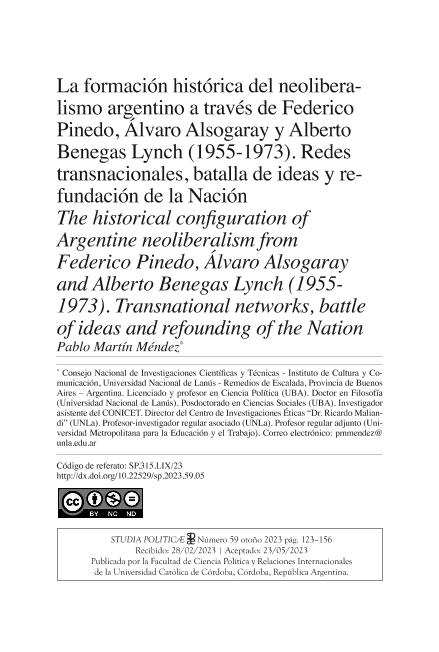Artículo
Este artículo se propone contribuir al conocimiento sobre la conformación del neoliberalismo en la Argentina entre 1955 y 1973. El punto de partida son los discursos de tres intelectuales que, durante el período analizado, articularon de diferentes maneras el liberalconservadurismo local con el neoliberalismo trasnacional. Se trata de Federico Pinedo, Álvaro Alsogaray y Alberto Benegas Lynch. El análisis reconstruye un conjunto de elementos trasversales a sus discursos, esto es: 1) la formulación de una posición polémica y combativa que promueve la batalla de ideas contra las opciones políticas consideradas como antiliberales; 2) el llamado a refundar la Argentina posperonista sobre las bases del liberalismo y las instituciones republicanas; y 3) la identificación de los antagonistas al proyecto de una Argentina “auténticamente liberal”. Sirviéndose de los aportes teórico-metodológicos de Michel Foucault y Ernesto Laclau, el artículo señala que la conformación histórica del neoliberalismo argentino obedece a dos estrategias discursivas complementarias: por un lado, la articulación de las ideas neoliberales con la tradición liberal establecida en la Argentina durante la segunda mitad del siglo XIX y, por el otro, la definición de un campo antagónico que ubica al intervencionismo estatal en relación de equivalencia con los totalitarismos europeos. Como se verá, ello supuso la polarización del escenario local en dos alternativas mutuamente excluyentes: liberalismo o totalitarismo. This article intends to contribute to knowledge about the neoliberalism configuration in Argentina between 1955 and 1973. The research is based on the discourses of Federico Pinedo, Álvaro Alsogaray and Alberto Benegas Lynch: three intellectuals who linked local liberal-conservativism with transnational neoliberalism during the period aforementioned. Our analysis will rebuild a set of common elements of Pinedo, Alsogaray and Benegas Lynch discourses, that is: 1) the formulation of a controversial and combative position that promotes the battle of ideas against political options considered anti-liberal; 2) the call of refounding the post-Peronist Argentina on the basis of liberalism and republican institutions; and 3) the identification of the antagonists to the project of an “authentically liberal” Argentina. Using the discourse theories of Michel Foucault and Ernesto Laclau, this project argues that Argentine neoliberalism was historically configured from two complementary discursive strategies: on the one hand, the articulation of neoliberal ideas with the liberal tradition established in Argentina during the second half of 19th century; on the other hand, the antagonism between liberal Argentina and redistributive and developmentalist policies, which are considered by neoliberal discourse as equivalent elements of European totalitarianism. As we will see, these discursive strategies implied the reduction of available political options and the polarization of the local scene according to two mutually exclusive alternatives: liberalism or totalitarianism.
La formación histórica del neoliberalismo argentino a través de Federico Pinedo, Álvaro Alsogaray y Alberto Benegas Lynch (1955-1973): Redes transnacionales, batalla de ideas y re-fundación de la Nación
Título:
The historical configuration of Argentine neoliberalism from Federico Pinedo, Álvaro Alsogaray and Alberto Benegas Lynch (1955- 1973): Transnational networks, battle of ideas and refounding of the Nation
Fecha de publicación:
06/2023
Editorial:
Universidad Católica de Córdoba
Revista:
Studia Politicae
ISSN:
1669-7405
e-ISSN:
2408-4182
Idioma:
Español
Tipo de recurso:
Artículo publicado
Clasificación temática:
Resumen
Palabras clave:
NEOLIBERALISMO
,
BATALLA DE IDEAS
,
REFUNDACIÓN NACIONAL
,
TOTALITARISMO
Archivos asociados
Licencia
Identificadores
Colecciones
Articulos(SEDE CENTRAL)
Articulos de SEDE CENTRAL
Articulos de SEDE CENTRAL
Citación
Méndez, Pablo Martín; La formación histórica del neoliberalismo argentino a través de Federico Pinedo, Álvaro Alsogaray y Alberto Benegas Lynch (1955-1973): Redes transnacionales, batalla de ideas y re-fundación de la Nación; Universidad Católica de Córdoba; Studia Politicae; 59; 6-2023; 123-156
Compartir




